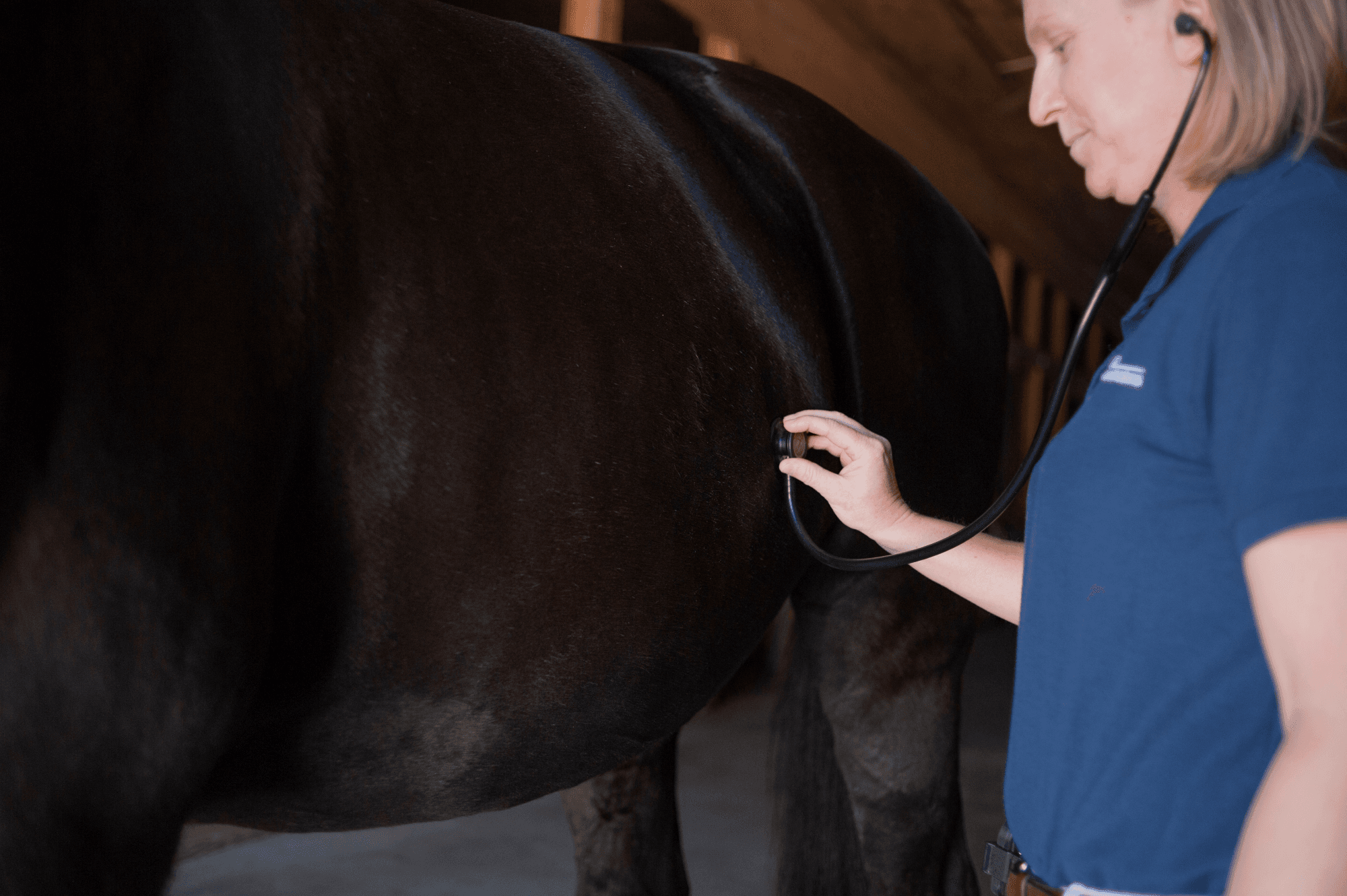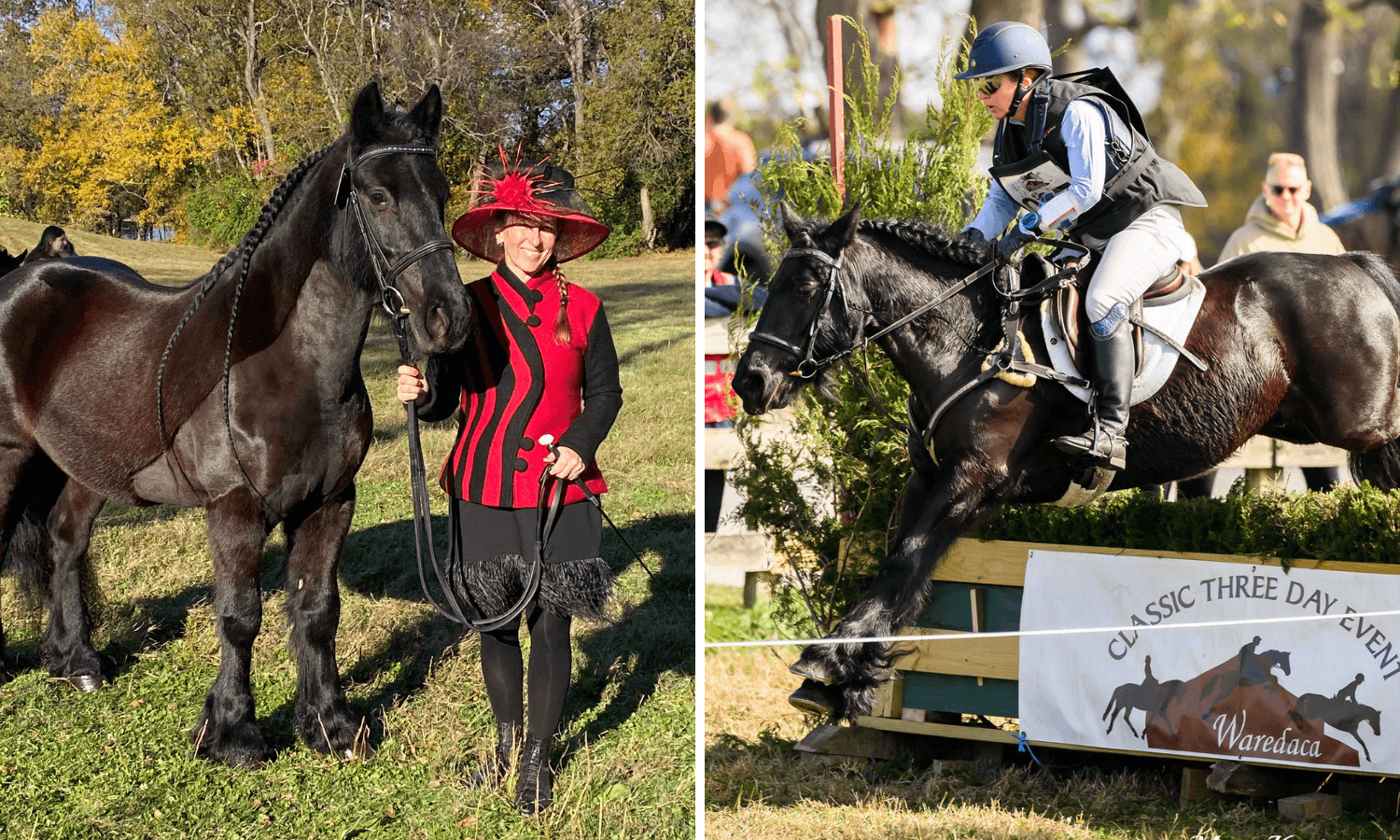Gas Colic in Horses (Spasmodic Colic)

Updated July 17, 2023 | Reviewed By: Andris J. Kaneps, DVM, PhD, DACVS, DACVSR
What is Gas Colic?
Colic is pain that originates in the abdomen. Gas colic, also referred to as spasmodic colic, is one of the most common types of colic in horses. It is defined as mild to moderate abdominal pain that is caused by the accumulation of gas in the intestine. Gas colic either resolves on its own or with medical treatment recommended or provided by your horse’s veterinarian.
Causes of Gas Colic in Horses
The pain associated with gas colic is caused by the stretching of the intestine due to the presence of gas and can be accompanied by repeated intestinal spasms. The mild or excessive gas build-up may be caused by:
- sudden changes in feed, such as switching to a different hay
- exposure to easily fermentable grasses or hay, such as grazing on pasture with high clover content or lush growth
- an impaction that prevents the normal passing of gas through the gastrointestinal tract
The only way the gas can be relieved is by passing through the intestinal tract as horses cannot burp or belch. Although the underlying cause of most gas colic episodes is rarely identified, the risk factors for all types of colic, including changes in diet, stabling, activity, and health care, are also associated with gas colic.
Signs of Gas Colic in Horses
The clinical signs of gas colic resemble those of other types of colic and may include:
- Pawing
- Looking at or biting at the belly
- Repeatedly lying down and getting up
- Repeated rolling
- Not eating or drinking
- Not passing manure
- Inappropriate sweating
- Stretching as if to urinate
- Depression or lethargy
- Elevated heart and/or respiratory rates
Horses experiencing gas colic may have observable distension of the abdomen, which often looks like a larger, filled flank compared to their normal. They may have frequent gut sounds during intestinal contractions, lack of gut sounds, or multiple quick gut sounds associated with spasmodic colic.
Treatment for Gas Colic in Horses
Even though gas colic is common, you should still speak with your veterinarian if your horse shows any signs of colic. Only your veterinarian can determine the likely cause of the colic and administer the appropriate treatment to relieve the horse’s discomfort and restore the GI tract to proper working order as quickly as possible.
Most horses with gas colic respond to anti-spasmodic medication, which reduces repeated gut contractures in response to gas distension, and non-steroidal medication which reduces intestinal pain. Horses with gas colic are also often administered treatments via a stomach tube, such as warm water with electrolytes or mineral oil that help reduce free gas and may treat constipation or manure impaction.
Though most gas colic episodes respond very well to medical treatment you and your veterinarian must have a plan in case hospitalization is necessary for a more in-depth work-up or intensive care for your horse.
Prevention and Recurrent Episodes
The best natural treatment for gas colic is prevention. Prevention involves following feeding and management best practices, such as:
- Making any hay and grain changes gradually
- Providing access to clean, fresh water at all times
- Gradual introduction to pasture grazing (particularly in the spring during the fast growth of grasses)
- Providing free exercise (turnout) as much as possible
- Making exercise changes (both increases or decreases) gradually
- Keeping up with preventive health care such as parasite control
Supplements That May Lend Support
Horses that undergo diet and management changes, that are prone to chronic gas colic, or that seem to just pass a lot of gas (“gassy horses”) may benefit from digestive supplements intended to support the normal health and function of the hindgut. These include products with ingredients such as yeast, enzymes, prebiotics and probiotics which are thought to nourish and maintain the population of microorganisms that naturally live within the horse’s digestive tract.
Does baking soda help gas colic in horses?
We caution that the effects of baking soda on an actively colicking horse have not been researched. Oral sodium bicarbonate at high levels may cause an electrolyte imbalance, such as elevated sodium (hypernatremia) and circulatory volume overload. Encapsulated bicarbonate is an ingredient in supplements specifically used to address excess fermentation in the hindgut. Read this article to understand the uses and myths of baking soda for horses.
About SmartPak
From the feed room to the tack room, SmartPak offers innovative solutions to help riders take great care of their horses. SmartPak was founded in 1999 with the introduction of the patented SmartPak supplement feeding system. The revolutionary, daily dose SmartPaks are custom-made for your horse, individually labeled and sealed for freshness. With the success of this simple and convenient feeding system, SmartPak has continued to expand its offering of quality products, including its own line of more than 90 supplement formulas under the SmartSupplements, Leg Up and Smart & Simple brands. The company also offers a wide variety of tack, equipment, and supplies. SmartPak has grown rapidly each year and is one of the largest retailers of equestrian products in the United States. SmartPak’s success has been powered by a passion for delivering an unbeatable customer experience, and the company has been recognized with a Bizrate Circle of Excellence award eight years in a row, as well as receiving an “Elite” rating from STELLAService.
About the United States Eventing Association
The USEA is a non-profit 501(c)(3) educational organization committed to providing eventing enthusiasts with a competitive level suited to their individual skills. By assisting and educating competitors, event organizers, and officials; maintaining responsible safety standards; and registering qualified competitions and clinics, the USEA offers a strong and continuous training opportunity for an ever-expanding field of world-class competitors. Just as importantly, the USEA provides a means for all riders, regardless of age or ability, to experience the thrill of eventing. To learn more, visit www.useventing.com.















